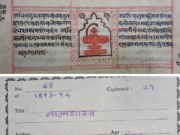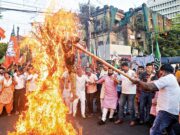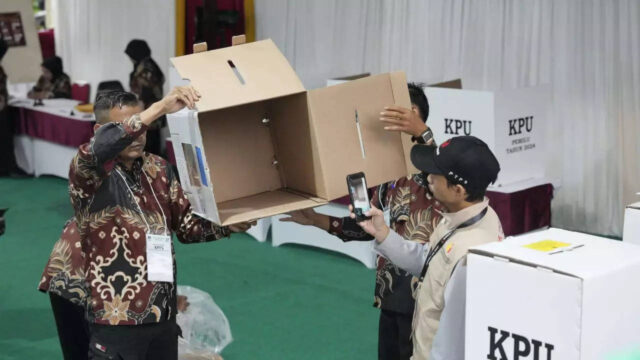NEW DELHI: Two defeated candidates in last week’s Indonesian election have urged the parliament to investigate the complaints of irregularities in the run-up to the event.
Although the independent observers said that there are no indications of systematic fraud in the world’s largest single-day election, still Anies Baswedan and Ganjar Pranowo called for an inquiry when parliament reconvenes on March 5.Ganjar said, “Something like this must be investigated. At the very least, parliament should hold a hearing.”
Official results are expected by March 20th, but unofficial counts show that Defence Minister Prabowo Subianto emerged as the winner with approximately 58% of the votes in a single round of voting. His rivals, Anies Baswedan and Ganjar, are projected to have secured 25% and 17% of the votes respectively, according to a preliminary count by election authorities.
However, both losing camps have raised concerns of voter intimidation, manipulation of state institutions, and misuse of state resources, including welfare funds, during the campaign period to influence the election outcome. Ganjar has called for an inquiry when parliament reconvenes on March 5th, stating, “Something like this must be investigated. At the very least, parliament should hold a hearing.” Anies, a former governor of Jakarta, expressed readiness to participate in a parliamentary inquiry to scrutinize government actions, calling it a positive step. Anies, who is not affiliated with any political party, has the backing of three parties, while Ganjar is supported by two parties, including the largest one in parliament, PDI-P.
Outgoing President Joko Widodo has faced criticism for his perceived endorsement of Prabowo and alleged attempts to influence the election outcome before voting day. However, Widodo and his allies have denied these accusations. Arya Fernandes from Indonesia’s Center for Strategic and International Studies noted that launching an inquiry would be challenging as it would require support from lawmakers. Even if approved, the inquiry would not have the power to annul the election results but could exert pressure on the new government.
Prabowo, who also contested and lost the presidential elections in 2014 and 2019, had challenged the outcomes in Indonesia’s Constitutional Court, citing widespread cheating. These efforts led to violent street demonstrations, but they were ultimately rejected.
Although the independent observers said that there are no indications of systematic fraud in the world’s largest single-day election, still Anies Baswedan and Ganjar Pranowo called for an inquiry when parliament reconvenes on March 5.Ganjar said, “Something like this must be investigated. At the very least, parliament should hold a hearing.”
Official results are expected by March 20th, but unofficial counts show that Defence Minister Prabowo Subianto emerged as the winner with approximately 58% of the votes in a single round of voting. His rivals, Anies Baswedan and Ganjar, are projected to have secured 25% and 17% of the votes respectively, according to a preliminary count by election authorities.
However, both losing camps have raised concerns of voter intimidation, manipulation of state institutions, and misuse of state resources, including welfare funds, during the campaign period to influence the election outcome. Ganjar has called for an inquiry when parliament reconvenes on March 5th, stating, “Something like this must be investigated. At the very least, parliament should hold a hearing.” Anies, a former governor of Jakarta, expressed readiness to participate in a parliamentary inquiry to scrutinize government actions, calling it a positive step. Anies, who is not affiliated with any political party, has the backing of three parties, while Ganjar is supported by two parties, including the largest one in parliament, PDI-P.
Outgoing President Joko Widodo has faced criticism for his perceived endorsement of Prabowo and alleged attempts to influence the election outcome before voting day. However, Widodo and his allies have denied these accusations. Arya Fernandes from Indonesia’s Center for Strategic and International Studies noted that launching an inquiry would be challenging as it would require support from lawmakers. Even if approved, the inquiry would not have the power to annul the election results but could exert pressure on the new government.
Prabowo, who also contested and lost the presidential elections in 2014 and 2019, had challenged the outcomes in Indonesia’s Constitutional Court, citing widespread cheating. These efforts led to violent street demonstrations, but they were ultimately rejected.






































